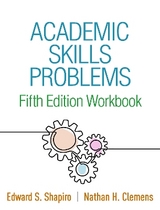
Academic Skills Problems Fourth Edition Workbook
Guilford Publications (Verlag)
978-1-60918-021-8 (ISBN)
- Titel erscheint in neuer Auflage
- Artikel merken
*Detailed how-to explanations, forms, and practice exercises help readers quickly develop proficiency in assessment and intervention.
*Includes ready-to-use, full-sized reproducibles.
Edward S. Shapiro, PhD, until his death in 2016, was Director of the Center for Promoting Research to Practice and Professor in the School Psychology Program at Lehigh University. Best known for his work in curriculum-based assessment and nonstandardized methods of assessing academic skills problems, Dr. Shapiro was author or coauthor of numerous books. He also developed the widely used BOSS (Behavioral Observation of Students in Schools) software system and presented papers, chaired symposia, and delivered invited addresses at conferences around the world. Dr. Shapiro's contributions to the field of school psychology have been recognized with the Outstanding Contributions to Training Award from Trainers of School Psychologists, the Distinguished Contribution to School Psychology Award from the Pennsylvania Psychological Association, the Eleanor and Joseph Lipsch Research Award from Lehigh University, and the Senior Scientist Award from the Division of School Psychology of the American Psychological Association, among other honors.
Introduction
STEP 1. ASSESSING THE ACADEMIC ENVIRONMENT
- Teacher Interview
- Academic Performance Rating Scale
- Student Interview
- Direct Observation: Manual for the Behavioral Observation of Students in Schools (BOSS)
Rationale
Identifying the Behaviors for Observation
Use of Technology in Conducting Systemic Observation
Guidelines for Paper-and-Pencil Direct Observation
Making a Coding Interval Recording
Completing Identifying Information
Observing Peer Comparison Students
Coding Academic Engagement
Coding Nonengagement
Coding Teacher-Directed Instruction
Review: Procedure for Conducting the Observation
Scoring the BOSS
Interpretation of BOSS Data
STEP 2. ASSESSING INSTRUCTIONAL PLACEMENT
- Reading
Oral Retell Techniques
Retell Techniques: Examples and Exercises
- Math
Using Digits Correct in Scoring Math Probes
Scoring Digits Correct in Addition and Subtraction Problems
Scoring Digits Correct in Multiplication Problems
Scoring Digits Correct in Division Problems
Math Concepts–Applications
-Spelling
Using Correct Letter Sequences in Scoring Spelling
Scoring Correct Letter Sequences
- Written Language
Scoring for Words Written
Scoring for Writing Mechanics
Assessing Quality of Longer Writing Samples
Scoring Brief Written Language Samples: Examples and Exercises
- Summary Form for Academic Assessment
STEP 3. INSTRUCTIONAL MODIFICATION
- The Folding-In Technique
Example: Folding-In Technique for Word Acquisition and Reading Fluency
Example: Folding-In Technique for Multiplication Facts
- Cover–Copy–Compare
Example: Cover–Copy–Compare for Addition Facts, Sums to 18
Example: Cover–Copy–Compare for Spelling
STEP 4.
| Erscheint lt. Verlag | 17.12.2010 |
|---|---|
| Verlagsort | New York |
| Sprache | englisch |
| Maße | 203 x 267 mm |
| Themenwelt | Geisteswissenschaften ► Psychologie ► Entwicklungspsychologie |
| Geisteswissenschaften ► Psychologie ► Pädagogische Psychologie | |
| Geisteswissenschaften ► Psychologie ► Test in der Psychologie | |
| Medizin / Pharmazie ► Medizinische Fachgebiete ► Psychiatrie / Psychotherapie | |
| Sozialwissenschaften ► Pädagogik ► Schulpädagogik / Grundschule | |
| ISBN-10 | 1-60918-021-6 / 1609180216 |
| ISBN-13 | 978-1-60918-021-8 / 9781609180218 |
| Zustand | Neuware |
| Informationen gemäß Produktsicherheitsverordnung (GPSR) | |
| Haben Sie eine Frage zum Produkt? |
aus dem Bereich



